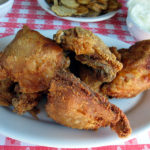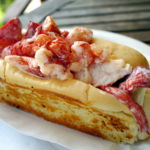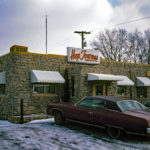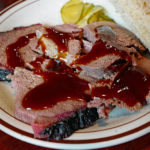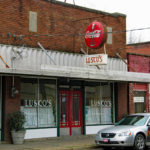A Fine Kettle of Fish
ALONG THE SLIM PENINSULA of northern Door County, Wisconsin, which juts out into Lake Michigan east of Menominee and north of Sturgeon Bay, the night sky erupts with flames all summer long. On the broad lawns of function halls, in churchyards, and at a handful of happy-go-lucky restaurants, fires rise from the extraordinary cooking ritual known as the fish boil.
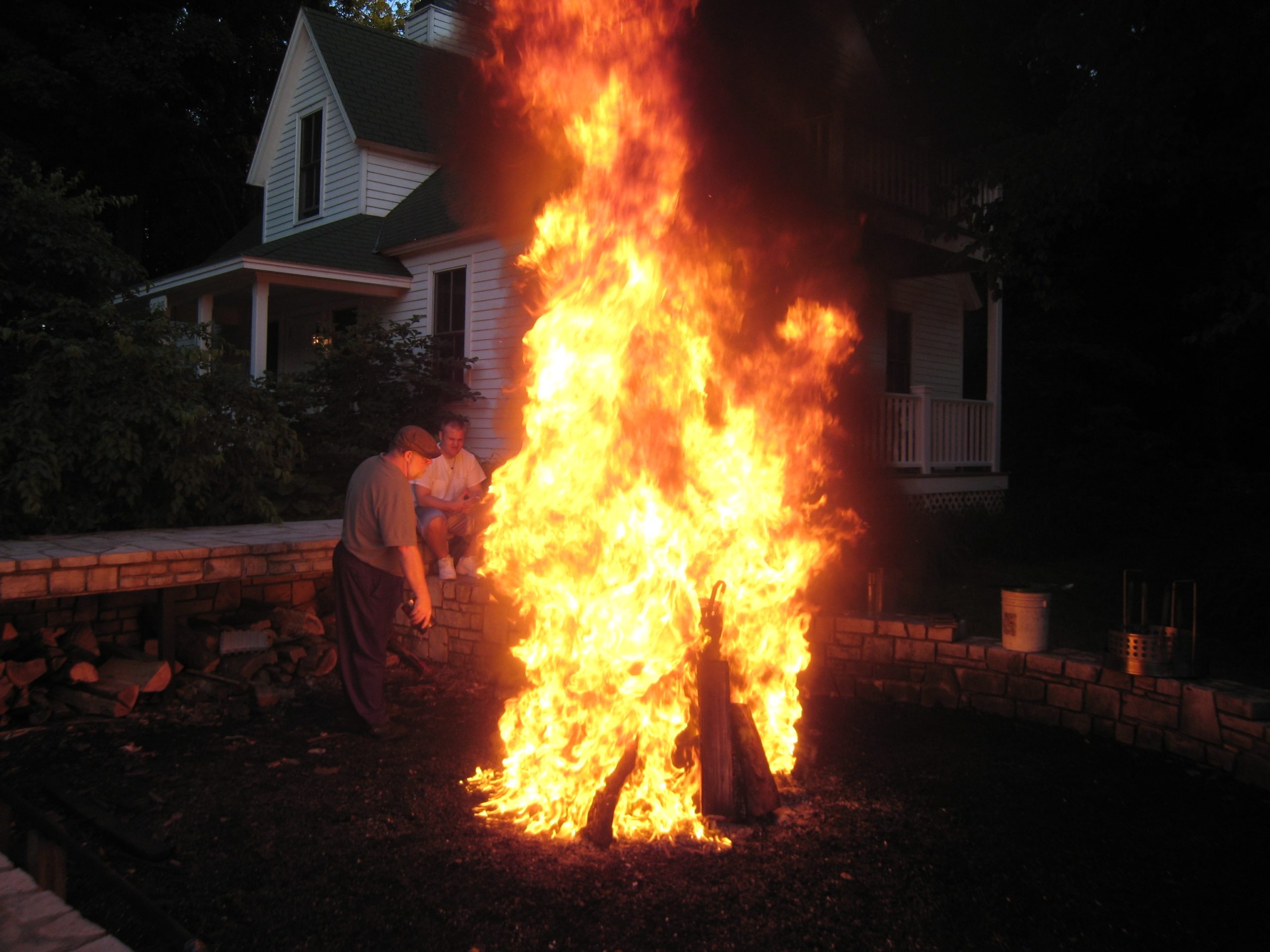
By Jane and Michael Stern
Originally Published 2006 Gourmet Magazine
ALONG THE SLIM PENINSULA of northern Door County, Wisconsin, which juts out into Lake Michigan east of Menominee and north of Sturgeon Bay, the night sky erupts with flames all summer long. On the broad lawns of function halls, in churchyards, and at a handful of happy-go-lucky restaurants, fires rise from the extraordinary cooking ritual known as the fish boil.
Steaks of Lake Michigan whitefish, along with red potatoes, are gathered in separate nets to bubble in a big iron cauldron over crackling hardwood. When the boilmaster decrees the food done, he tosses a pint of kerosene straight into the fire. It explodes like Independence Day, flames engulfing the cook pot and instantly jacking up the heat. In the flash of the blaze, the heavily salted water boils over and splashes down onto the inferno, nearly extinguishing it.
The big bang that signals the end of a fish boil isn’t only for dramatic effect. It ensures the taste of the whitefish. Russ Ostrand, who was boilmaster at the White Gull Inn in Fish Creek for 32 years, explained to us long ago that a ratio of one pound of salt for every two gallons of water in the pot makes the ingredients want to float. As the fish cooks in its net, the oils rise to the surface. The volcanic upsurge at the moment of the boil-over forces all the oils and impurities to cascade over the edge, leaving nothing in the boiling water but clean-flavored fish steaks and potatoes.
Timing is crucial. Once the water in the cauldron hits a rolling boil, the potatoes go into the pot along with half the total salt. Onlookers gasp: Surely, this is going to be the saltiest meal ever served. The potatoes cook for 20 minutes, during which hungry customers gather around the fire on the patio and drink beer or cider. Accordion music is an essential part of the ceremony. Ostrand used to wear both hats—cook and musician—and told us that he started playing the accordion so people wouldn’t get bored just staring at a pot over a fire. At the 20-minute mark, the fish is added to the cauldron along with the rest of the salt. Eight to nine minutes later, when the fish tests done, not quite breaking apart under its own weight, the kerosene conflagration signals that it’s time to eat.
For those of us who are skeptical about the flavor potential of boiled fish, not to mention vastly oversalted boiled fish, this true Wisconsin meal turns out to be stunning. The thick hunks of whitefish remind us of lobster: milk-moist, dense, and fine-textured. Incredibly, their elusive freshwater sweetness is just barely haloed by the presence of salt. At the White Gull Inn, when the flames have subsided, you go indoors and are given a plate crowded with a brace of steaks along with potatoes (which absorb only a bit more of the salt), then you have the opportunity to drench the whole shebang with melted Badger State butter or to sprinkle it with lemon and pepper, if you prefer. (Most other chefs in Door County also include onions that get boiled along with the potatoes, but at the White Gull Inn they feel that onions overpower the subtle flavor of the freshwater fish.) Every table gets a help-yourself bowl of coleslaw and a variety of seasonal sweet breads—blueberry in the summer, pumpkin and apple in the fall—as well as Swedish limpa rye. If you want seconds of anything, just ask. And the de rigueur dessert is house-baked cherry pie a la mode. Door County is one of the nation’s primary sources of tart Montmorency cherries, which make the best pie. At the White Gull Inn, fish boils take place three times a night on Wednesdays, Fridays, Saturdays, and Sundays throughout the summer. They’re also held on Fridays during the winter. Reservations well in advance are almost always necessary.
THE INN IS AN ESPECIALLY GOOD SETTING for this local custom not only because it is done with such panache there, but because the place itself is part of Door County history. Built in 1896 as a spa by virologist Herman Welcker, a German immigrant, “The Henriette” (named for his wife) signaled the evolution of the area from fisherman’s retreat to summer resort. Whether or not Welcker was aware of the locals’ pyrotechnic style of cooking fish is unknown; he had different plans for guests. Welcker’s health regimen included swimming and meditation and groaning-board meals of roast pork, Wiener schnitzel, and cabbage, followed by cakes piled with whipped cream.
In the late 1950s, Andy and Elsie Redmann bought the Victorian inn and gave it an Early American makeover, including a menu of turkey, glazed ham, and baked beans, as well as a weekly fish boil. Before the Redmanns added the unique meal of the region to their kitchen’s repertoire, fish boils were not a restaurant event. While many citizens had their own boil pots, they were generally reserved for large gatherings such as church suppers and family reunions.
When current owners Jan and Andy Coulson took over, in 1972, Ostrand was already part of the White Gull Inn experience, and he was well established as the county’s premier fish boiler. It was from Ostrand that Andy Coulson learned how to do it. Since 1997, when Ostrand died, Coulson has shared boil-pot duties with Tom Christianson, but neither one is an accomplished musician, so today’s squeeze-box is plied by Lou Close, who strolls the patio and plays requests while the fish is boiling, then goes into the dining room and continues, table to table, during dinner. Among his most requested numbers are “Roll Out the Barrel” and “On, Wisconsin.”
Ingrained as the fish boil tradition is in Door County life, no one knows for sure when or how it began. Most people think it was started by fishermen of Scandinavian ancestry. “Their boats were equipped with pot bellied stoves,” Andy Coulson says. “All they needed to stock on board was salt and potatoes. Or maybe the fish boil began with bonfires on the beach when they came ashore to clean their catch.” Coulson points out that for the old-time fishermen, as well as for crowds of contemporary visitors who come north to enjoy the cool breezes that waft in off Lake Michigan every summer, one big appeal of the fish boil is the camaraderie it inspires among large groups of people. The bonfire and spectacular boil-over bring strangers together in an ebullient mix of awe and hunger. “As a meal for six, it is inefficient,” Coulson says. “But for a dozen or more, it’s a thing of beauty. This is Door County’s answer to the all-American barbecue.”
Discuss
What do you think of A Fine Kettle of Fish?
Related Articles
Stroud’s
By Jane and Michael Stern Originally Published 1995 Gourmet Magazine Chicken...
The Lobster Roll Honor Roll
Maine is the only state in America that features a picture of cooked food on its license...
Meat-And-Three
A few years back, country singer Ray Stevens invited a New York friend to join him at one of...
Top 12 favorite Ice Cream Scoops
WITH THE EXCEPTION of the hot dog bun, there has never been an edible invention as...
Top 5 BBQ Restaurants | Western Kentucky
Get yourself to Western Kentucky for great BBQ I see the food shows on TV where...
Best restaurants in Greenwood, MS | Hot Licks Delta Style
Ever since we first ate margarine-sauced pompano at Lusco’s, in Greenwood,...

